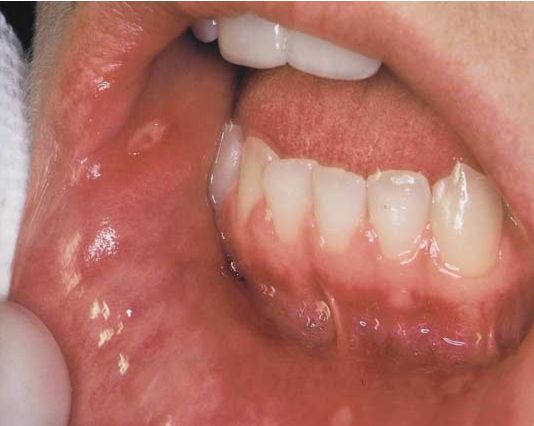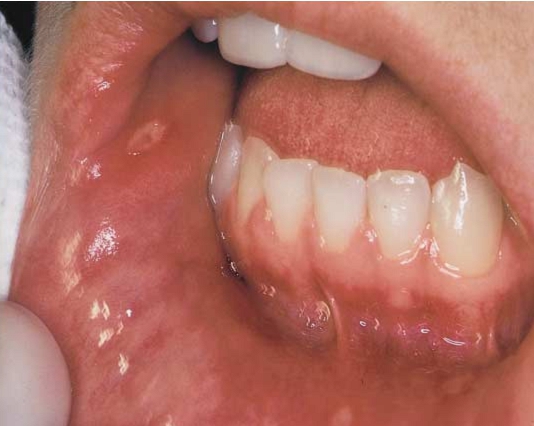
What Causes Mouth Ulcers?
People use lots of different names to describe recurring aphthous ulcers (canker sores, recurring aphthous stomatitis, oral ulcers etc.), but they all describe the same condition.

Although a small minority of people may be predisposed to aphthous ulcers because of systemic diseases (diseases affecting multiple areas of the body), canker sores are typically a localized problem resulting from a local activation of immune cells where the ulcer or ulcers appear.
There likely is a significant genetic basis for this condition, since people often report a history of ulcers in their family, and there are numerous different factors that can cause ulcers to appear. Rather than have me read them all off one by one on video I thought it would be easier to write them out below.
Contributing Factors to Aphthous Ulcers
Trauma – Trauma, such as bumping your gums with your toothbrush, is a frequent cause of canker sores.
Stress – Periods of high stress can provoke episodes of aphthous ulcers, but this association is highly variable
Foods – As we talked about last week, there are numerous different foods that cause canker sores. In addition to the food products we discussed it is worth looking into whether sodium lauryl sulfate a common surfactant in toothpastes might be causing your ulcerations. Try using an SLS free toothpaste with fluoride, they are hard to find, but if it helps then the search is worth it.
Hormonal Imbalances – Normal hormonal cycles associated with menstruation have been shown to provoke oral ulcers in women. On the other hand, outbreaks have been seen to decrease during pregnancy and with the use of oral contraceptives.
Tobacco Smoking – Ironically patients suffering from recurring aphthous ulcers are usually nonsmokers, and there is a lower prevalence and severity of aphthous ulcers among heavy smokers compared to moderate smokers. Some patients have also reported the onset of oral ulcers after they stop smoking, and a decrease in ulcers when they begin smoking again. The use of smokeless tobacco has also been associated with a significantly lower prevalence of canker sores. Nicotine-contianing tablets also appear to help control the frequency of canker sores (e-cigarettes would likely produce the same effect). An exact mechanism hasn’t been identified for these observations, but at any rate this doesn’t make using cigarettes or nicotine a good idea for your health.
Conditions Mimicking Canker Sores
Oral Exposure to Certain Drugs – Nicorandil (a potassium channel blocker used in cardiac disease) and nonsteroidal anti-inflmammtory drugs (aspirin, ibuprofen, etc.) may produce ulcers similar to canker sores. Talk with your doctor about changing medications first.
Immune System Disturbances – Ulcers have been seen in HIV positive patients, immunodeficient individuals, myelodysplastic syndromes, and forms of neutropenia. If you have one of these conditions you will likely already be aware of it; the ulcers are not a sign of these diseases.
Hematinic Deficiencies – Deficiencies of Vitamins B1, B2, B6, B12, Folic Acid, or Iron have been found with increased incidence in people experiencing aphthous ulcers. A simple blood test administered by your physician will identify if you have any of these vitamin or mineral deficiencies.
Gastrointestinal Diseases – Celiac disease (gluten intolerance) is seen more frequently in people with recurring aphthous stomatitis. Crohn’s disease and ulcerative colitis may also be accompanied by oral ulcers. Treatment of these conditions will help the ulcers.
Other Systemic Conditions – Behcet’s syndrome and Sweet’s syndrome are more complex disorders that produce oral ulcers along with lesions and sores on other parts of the body. If you are noticing ulcers simultaneously in areas other than just the mouth see your doctor.
Knowing which factors might be a problem for you can help you make changes to avoid frequent oral ulcers. Most people also experience a localized burning or pain for 24 to 48 hours prior to the ulcers appearing, which will allow you to treating ulcers early and help them heal faster. I will go over different treatments for ulcers next week.
Conclusion
That wraps up this guide on what you should know about mouth ulcers. Contact us today for more information or additional questions!